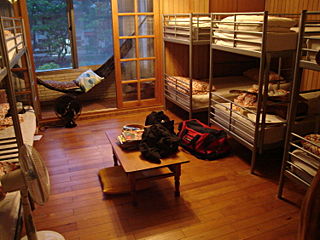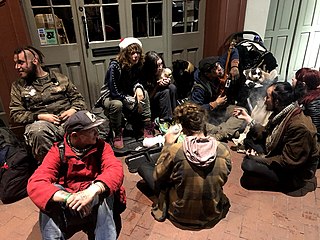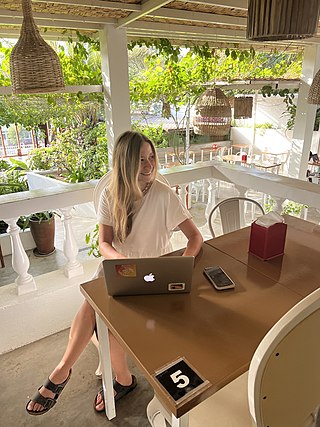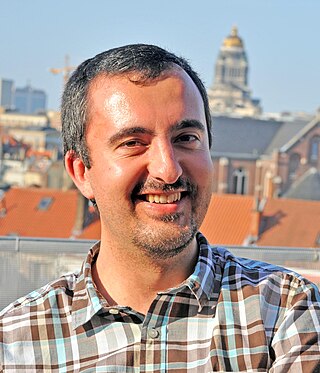Related Research Articles

A nomad is a member of a community without fixed habitation who regularly moves to and from areas. Such groups include hunter-gatherers, pastoral nomads, tinkers and trader nomads. In the twentieth century, the population of nomadic pastoral tribes slowly decreased, reaching an estimated 30–40 million nomads in the world as of 1995.

Human migration is the movement of people from one place to another with intentions of settling, permanently or temporarily, at a new location.

A hostel is a form of low-cost, short-term shared sociable lodging where guests can rent a bed, usually a bunk bed in a dormitory, with shared use of a lounge and sometimes a kitchen. Rooms can be mixed or single-sex and have private or shared bathrooms. Private rooms may also be available, but the property must offer dormitories to be considered a hostel. Hostels are popular forms of lodging for backpackers. They are part of the sharing economy. Benefits of hostels include lower costs and opportunities to meet people from different places, find travel partners, and share travel ideas. Some hostels, such as in India or Hostelling International, cater to a niche market of travelers. For example, one hostel might feature in-house social gatherings such as movie nights or communal dinners, another might feature local tours, one might be known for its parties, and another might have a quieter place to relax in serenity, or be located on the beach. Newer hostels focus on a more trendy design interior, some of which are on par with boutique hotels. Some may cater to older digital nomads, global nomads, and perpetual travelers that prefer slightly more upmarket private rooms or a quieter atmosphere.
An alternative lifestyle is a lifestyle perceived to be outside the norm for a given culture. The phrase "alternative lifestyle" is often used pejoratively. Description of a related set of activities as alternative is a defining aspect of certain subcultures.

Backpacking is a form of low-cost, independent travel, which often includes staying in inexpensive lodgings and carrying all necessary possessions in a backpack. Once seen as a marginal form of travel undertaken only through necessity, it has become a mainstream form of tourism.

In the United States, a military brat is the child of a parent(s), adopted parent(s) or legal guardian(s) serving full-time in the United States Armed Forces, whether current or former. The term military brat can also refer to the subculture and lifestyle of such families.

A gutter punk is a homeless or transient individual who displays a variety of specific lifestyle traits and characteristics that often, but not always, are associated with the punk subculture. Attributes may include unkempt dreadlocks, nose rings, Mohawk hairstyles, and tattooed faces. Gutter punks are sometimes referred to as "crusties", "crusty punks", "crust punks", or “crusty kids”; "traveling" or "traveler kids"; "traveling" or "traveler punks", or simply "travelers"; and "punk hobos" or "hobo-punks", among other terms. Some self-identified gutter punks may distinguish themselves from "crusties" or "crust punks" and "travellers", and vice versa; however, there is considerable overlap between the groups, and the terms are often used interchangeably.

Saskia Sassen is a Dutch-American sociologist noted for her analyses of globalization and international human migration. She is a professor of sociology at Columbia University in New York City, and the London School of Economics. The term global city was coined and popularized by Sassen in her 1991 work, The Global City: New York, London, Tokyo.

New Age Travellers are people located primarily in the United Kingdom generally espousing New Age beliefs with hippie / Bohemian culture of the 1960s. New Age Travellers were often referred to as crusties or gutter punks and used to travel between free music festivals and fairs prior to crackdown in the 1990s. New Traveller also refers to those who are not traditionally of an ethnic nomadic group but who have chosen to pursue a nomadic lifestyle.
Dromomania was a historical psychiatric diagnosis whose primary symptom was uncontrollable urge to walk or wander. Dromomania has also been referred to as traveling fugue. Non-clinically, the term has come to be used to describe a desire for frequent traveling or wanderlust.
Geographic mobility is the measure of how populations and goods move over time. Geographic mobility, population mobility, or more simply mobility is also a statistic that measures migration within a population. Commonly used in demography and human geography, it may also be used to describe the movement of animals between populations. These moves can be as large scale as international migrations or as small as regional commuting arrangements. Geographic mobility has a large impact on many sociological factors in a community and is a current topic of academic research. It varies between different regions depending on both formal policies and established social norms, and has different effects and responses in different societies. Population mobility has implications ranging from administrative changes in government and impacts on local economic growth to housing markets and demand for regional services.
The Rabari people are an ethnic group from the Rajasthan that is also found in Gujarat, Kutch region and Sindh province of Pakistan.

Sustainable tourism is a concept that covers the complete tourism experience, including concern for economic, social and environmental issues as well as attention to improving tourists' experiences and addressing the needs of host communities. Sustainable tourism should embrace concerns for environmental protection, social equity, and the quality of life, cultural diversity, and a dynamic, viable economy delivering jobs and prosperity for all. It has its roots in sustainable development and there can be some confusion as to what "sustainable tourism" means. There is now broad consensus that tourism should be sustainable. In fact, all forms of tourism have the potential to be sustainable if planned, developed and managed properly. Tourist development organizations are promoting sustainable tourism practices in order to mitigate negative effects caused by the growing impact of tourism, for example its environmental impacts.

In law, no fixed abode or without fixed abode is not having a fixed geographical location as a residence, commonly referred to as no fixed address. This is applicable to several groups:

A military brat is a child of serving or retired military personnel. Military brats are associated with a unique subculture and cultural identity. A military brat's childhood or adolescent life may be immersed in military culture to the point where the mainstream culture of their home country may seem foreign or peripheral. In many countries where there are military brat subcultures, the child's family moves great distances from one non-combat assignment to another for much of their youth.

Digital nomads are people who travel freely while working remotely using technology and the internet. Such people generally have minimal material possessions and work remotely in temporary housing, hotels, cafes, public libraries, co-working spaces, or recreational vehicles, using Wi-Fi, smartphones or mobile hotspots to access the Internet. The majority of digital nomads describe themselves as programmers, content creators, designers, or developers. Some digital nomads are perpetual travelers, while others only maintain the lifestyle for a short period of time. While some nomads travel through multiple countries, others remain in one area, and some may choose to travel while living in a vehicle, in a practice often known as van-dwelling. In 2020, a research study found that 10.9 million American workers described themselves as digital nomads, an increase of 49% from 2019.
Third culture kids (TCK) or third culture individuals (TCI) are people who were raised in a culture other than their parents' or the culture of their country of nationality, and also live in a different environment during a significant part of their child development years. They typically are exposed to a greater volume and variety of cultural influences than those who grow up in one particular cultural setting. The term applies to both adults and children, as the term kid refers to the individual's formative or developmental years. However, for clarification, sometimes the term adult third culture kid (ATCK) is used.
Mobilities is a contemporary paradigm in the social sciences that explores the movement of people, ideas and things (transport), as well as the broader social implications of those movements. Mobility can also be thought as the movement of people through social classes, social mobility or income, income mobility.

Noel B. Salazar is a sociocultural anthropologist known for his transdisciplinary work on mobility and travel, the local-to-global nexus, discourses and imaginaries of 'Otherness', heritage, cultural brokering, cosmopolitanism and endurance.

Child Identity is not only a psychological structure, but also a complex subject of contemporary humanitarian science. Identity formation is a complex process that is never completed. When we research the problems of identity we want to answer questions "Who we are?", "Do we choose our identity?", "Is identity given to us or do we create our own?", etc. In a world of change, children are faced with many questions and struggles as they sort out their multiple identities. Children begin to ask identity questions at an early age. "Who am I?" "Who is my family?" "Where do I belong?" "Why does my family celebrate some holidays and not others?". These are all standard questions children ask to determine how they fit into their world.
References
- ↑ Richards, G. & Wilson, J. 2004. The Global Nomad: Backpacker Travel in Theory and Practice. Clevedon: Channel View Publications.[ ISBN missing ][ page needed ]
- ↑ Khazanov, A. M. 1994. Nomads and the Outside World (2nd edition) [1983], translated by J. Crookenden. Wisconsin: The University of Wisconsin Press.[ ISBN missing ][ page needed ]
- ↑ Benjamin, S., & Dervin, F. (Eds.). 2014. Migration, Diversity, and Education: Beyond Third Culture Kids. London: Palgrave MacMillan.[ ISBN missing ][ page needed ]
- ↑ D’Andrea, A. 2006. Global Nomads. Techno and New Age as Transnational Countercultures in Ibiza and Goa. London: Routledge.[ ISBN missing ][ page needed ]
- ↑ Elliott, A., Urry, J. (2011) Mobile Lives. Cambridge: Routledge[ ISBN missing ][ page needed ]
- ↑ Kannisto, P. 2014. Global Nomads: Challenges of Mobility in the Sedentary World. Tilburg: Tilburg University Press. Available at https://pure.uvt.nl/portal/files/3511053/Kannisto_Global_18_06_2014.pdf
- ↑ Kannisto, p. 2016. Global Nomads and Extreme Mobilities. Ashgate: Farnham. [ ISBN missing ][ page needed ]
- ↑ Elgan, M. (1 August 2009), Is Digital Nomad Living Going Mainstream?, Computerworld
- ↑ Kannisto, P. and Kannisto, S. 2012. Free as a Global Nomad: An Old Tradition with a Modern Twist. Phoenix, AZ: Drifting Sands Press. [ ISBN missing ][ page needed ]